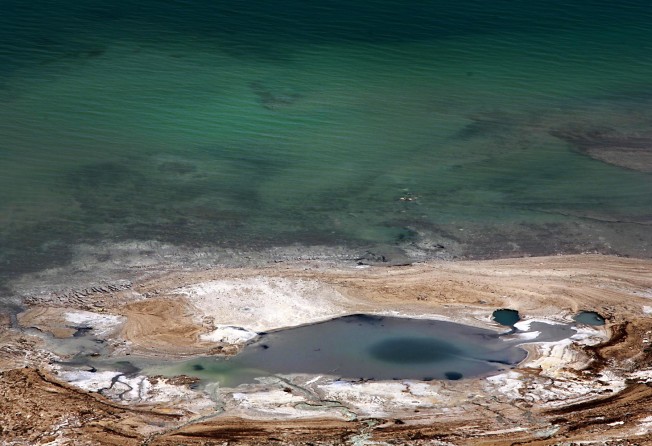
Israel, Jordan and Palestine agree to link Red Sea with shrinking Dead Sea
Historic agreement signed by Israel, Jordan and Palestine for a pipeline from the Red Sea to replenish natural wonder's shrinking water stocks

Israel, Jordan and Palestine have signed an agreement on an ambitious and controversial project to replenish the rapidly shrinking Dead Sea by transferring water from the Red Sea along a 175-kilometre pipeline.
Israel's energy and infrastructure minister, Silvan Shalom, said the deal was "nothing less than a historic development".

The operation would help to slow the desiccation of the Dead Sea, situated at the lowest point on earth and famous for its high levels of salt and other minerals that allow bathers to float on its surface.
Desalinated Red Sea water will be supplied to the Israeli city of Eilat and the Jordanian city of Aqaba for consumption.
But analysts said the agreement was a vastly scaled back version of a grandiose Red-Dead project that had been under consideration for almost 20 years.
They said it would provide less than a tenth of the volume of water needed to stabilise the Dead Sea while threatening its unique characteristics, and would not alleviate severe water shortages.
Under the agreement, 200 million cubic metres of water will be pumped from the Red Sea each year.
About half will be desalinated at a new plant in Aqaba, at the northern tip of the Red Sea, and the rest will be piped to the Dead Sea to help replenish its waters, which are shrinking by a metre each year.
Construction of the pipeline, to be laid on Jordanian territory, is likely to take up to five years and cost up to US$655 million. Israel will sell water from the Sea of Galilee to Jordan and desalinated water to the Palestinians.
The Dead Sea lies more than 400 metres below sea level.
It is a magnet for tourists who go to float in its mineral-rich waters and smother themselves with the dense black mud that forms its bed.
Its eastern shore is in Jordan and its western side sits under Israeli control, although about two-thirds lie in Palestinian territory in the West Bank.
In addition to the lucrative tourist industry, global sales from Ahava Dead Sea Laboratories, an Israeli firm that manufactures Dead Sea beauty products, are worth around US$164 million a year. Palestinians are denied access to the economic potential of the Dead Sea.
Water levels have been declining for about 40 years, the lake's surface area has shrunk by 30 per cent in the past two decades and thousands of sinkholes have appeared on its shore.
This is a way of saving face rather than saving the Dead Sea
The main cause of the decline is the appropriation of more than 90 per cent of water from the River Jordan north of the Dead Sea for agricultural and domestic use by Israel, Syria and Jordan.
The commercial and industrial extraction of vital minerals from the sea itself has also played a part.
The idea of pumping water from the Red Sea to the Dead Sea - a project known as the Red-Dead Conduit or Two Seas Canal - has been criticised by environmentalists. They argue that the introduction of Red Sea water containing living organisms could have a catastrophic effect on the unique characteristics of the Dead Sea.
Experiments to mix water from the two seas have produced changes to its biological and chemical composition, with the growth of algae and colour changes caused by blooming bacteria.
Friends of the Earth Middle East (FoEME) has criticised the Red-Dead project as playing with nature and failing to address the root causes of the decline of the Dead Sea.
The project would supply less than 100 million of the 800 million cubic metres of water needed each year to stabilise the Dead Sea at current levels.
"This is a way of saving face rather than saving the Dead Sea," said Gidon Bromberg, of FoEME.
Eran Feitelson, professor of geography and public policy at the Hebrew university in Jerusalem, said he had not seen details of the agreement, but "it looks as though it's a very far cry from the project that was talked about".